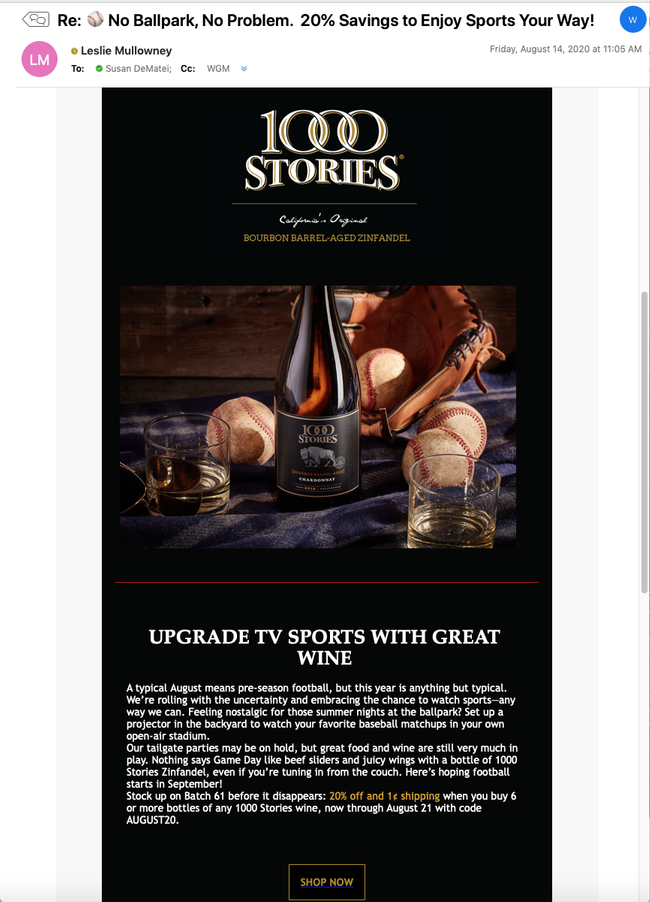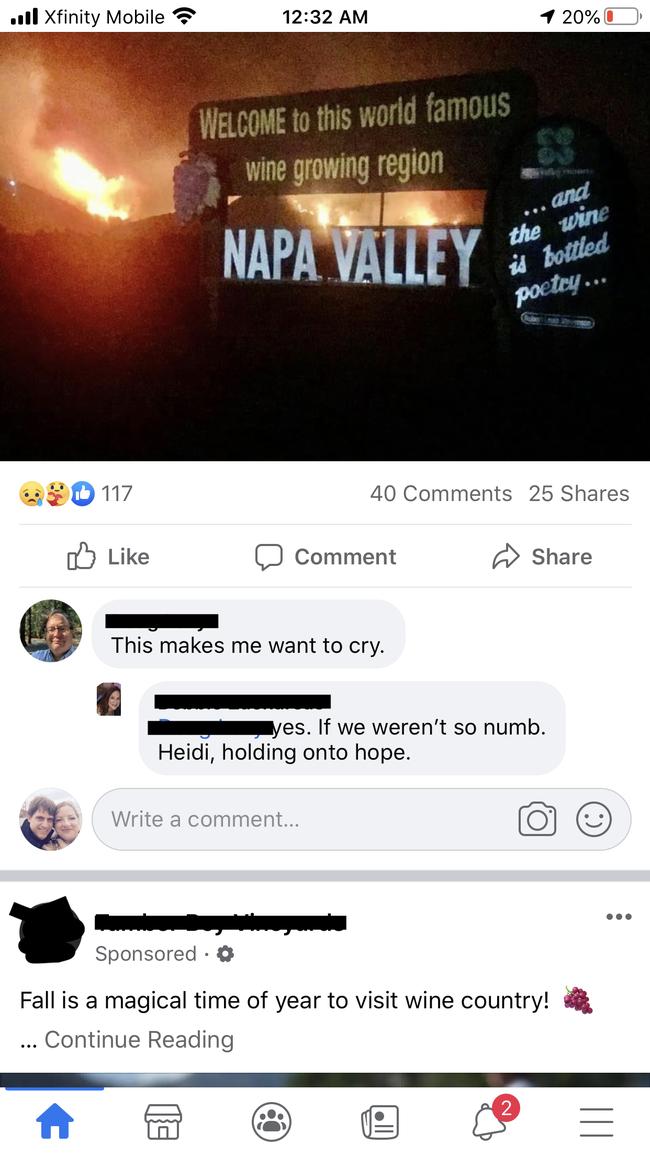
Marketing Dos and Don’ts for the Apocalypse
What do we say when the destruction and 2020 have left many of us speechless?
Last week we faced even more fires raging during an already challenging harvest. The timing is exceptionally cruel when you consider that typically Q4 can amount to 50% of some businesses’ annual sales. Overlay the reality that Q1-Q3 of 2020 has not met expectations putting a hyper-focus on the last quarter, and most are left feeling pressure to hit Q4 out of the park.
But what do we say when the destruction and 2020 have left many of us speechless? Hopefully, this article will give some suggestions on how to pivot (there’s that word again) this year’s holiday messages.
1. Empathy and Humanity over Pity and Desperation
The studies on marketing during difficult times are too numerous to mention, but they all say roughly the same thing – in times of stress, emotional messaging trumps rational thought. Rational marketing is trying to sell something with a sensible argument, and emotional marketing is trying to connect with someone to move them toward the desired effect.
It’s ok to be vulnerable and let your customers in on your situation. The key is not to share too much or make it seem like you’re begging for sales. The pity strategy will fall flat after a particularly challenging year for most. Instead, place yourself in their shoes. What would they want to know? How can you help solve their problems? How can you position your brand or product to make their day better? Empathy is all about seeing the world through your customer’s eyes. If you do that, you can’t go wrong.
2. Be sensitive to increased emotions from your customers.
Everyone is a little raw after this year’s calamities. Our customers are anxious, overwhelmed, unpredictable, and can be more sensitive than usual. Don’t expect them to respond like they usually do. Knowing the emotional state of your customers should inform the tone and voice you use in your messaging. Overall, brands that we know and trust provide comfort in times of uncertainty. Wine has unique properties as a product because, for many, it conjures up memories of pleasure, relaxation, and camaraderie. Your default voice should be calm and positive vs. hard-sell or overly enthusiastic.
It’s ok to be vulnerable and let your customers in on your situation.
3. Expect (sometimes radical) fluctuation in buying behavior.
We said that customers wouldn’t respond like they usually do – well, this isn’t going to be a holiday like we usually have. In addition to the emotional factors above, three significant realities will affect your Q4 marketing programs:
- The election will distract until mid-November.
- Many of your customers are now unemployed.
- Customers will not be able to gather for holiday celebrations (meaning consume your product) like in other years.
You can’t throw together some holiday gift sets and call this season a wrap. You can still provide serving suggestions, recipes, and reasons to enjoy your wine, but make sure it isn’t tone-deaf to the new reality people live in. This goes for photography, too. Images of a happy “Friendsgiving” around a table will likely have the opposite effect than intended and depress your recipients.
4. Focus on what they have, not what is lost.
There are things to celebrate this year. We slowed down and got to know our families a little better. We rediscovered the lost simple pleasures of baking or board games. We were able to be introspective when we didn’t have our focus outward toward others. There is a ripple effect creating trends we’ll see in holiday gifts of handmade items, home crafts, and cozy slippers and sweaters. Your marketing could highlight intimate holiday moments or quiet reflections to dovetail with these trends.
5. Know your customer and know your role in their life.
We covered this separately in this blog post. Essentially, your customers will fall into one of four groups, and your product will fall into one of four groups. When you’ve identified your group and your role, you can determine which is more appropriate – a “don’t feel guilty we’re giving to charity” or a “you deserve a treat today” email.
Be empathetic, be responsive, be thoughtful.
What Marketing Should Not Do During Q4 2020
(or, “Don’t be a Self-Serving Jerk”)
1. Don’t try to capitalize on 2020
Revisit points one and two above – empathy goes a long way, and tensions and emotions are running high. People affected by any terrible part of 2020, directly or peripherally, may be oversensitive and stressed out. An innocent COVID coupon code or joke about a fire sale can push an ordinarily sane person into an angry online rant. Someone that just lost a loved one might not appreciate an email saying we should celebrate. It doesn’t matter how thankful you are that you dodged a fire, COVID, a hurricane, or murder hornets; it doesn’t give you the license to capitalize on the news when others aren’t as fortunate.
Lately, we’ve seen a small flurry of high-end wineries sending out righteous emails about how the fruit this season isn’t up to their high standards, so they are not producing a 2020 wine. That’s fine, but way to spoil it for your neighbor or other regions that might have a perfectly fine 2020 vintage. If consumers get several emails about smoke taint, what do you think the lasting impression will be of the 2020 vintage? Turning a negative into a positive isn’t always the jerk thing to do, but it is if it is at the expense of others or you’re trying to say you’re somehow more special/stronger/better than others going through the same challenges.
2. Turn off your automatic ads.
This is especially true over weekends. On Sunday the 27th, I was scanning through Facebook to see what wineries were burning only to find an ad about how fall was a magical time in Napa. It is understandable as the news was fresh, but we’ve seen many ill-timed ads in 2020 that are in stark contrast with the reality of visiting and access. This Facebook ad is not an isolated example. Social media is immediate, and a price for using it means you need to keep on your toes and occasionally update your postings in real-time.
3. Don’t feel pressured into extreme discounts.
If you’ve had a rough 2020, you may feel pressure to offer deep discounts to move some heavy volume this holiday season. And that may work. But if you intend to continue selling when blue skies re-appear next spring, you’re going to find it difficult to walk away from those discounts. Although the economy is challenging, most of our consumers – the people that routinely drink $30 bottles of wine – aren’t saving the pennies in their couches. They are not waiting for a discount. There are other reasons they open your holiday email. They like you, remember happier times on vacation with you, or are looking for a gift for someone they can’t be with this season. In very few of those scenarios is a considerable discount required to close the sale.
Also, as noted above, people look for the familiarity and comfort of known brands in times of stress. If you discount more than what they usually expect, you’re not fitting into that construct and risk alienating a customer.
A final note about marketing during Q4:
Ask yourself if your marketing campaign would help you if you’d been displaced from your home or had a loved one die from COVID. Does this campaign help your customers get their lives back to normal? If your marketing message doesn’t help people get their lives back to normal, rethink it until it does.
Be empathetic, be responsive, be thoughtful, and make it comfortable and familiar for them to purchase. Your customers will remember and reward you with sales.
And don’t discount “normal.” Right now, it’s the only thing many of us want for Christmas.




